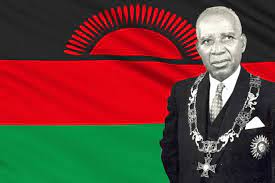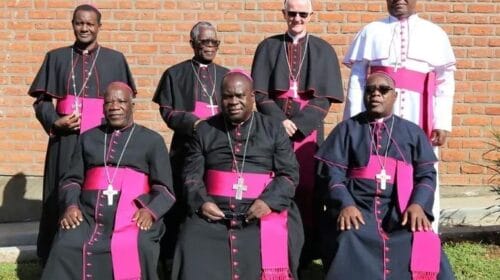Imo Gubernatorial Judgment: When Number Four Became Number One By Achike Chude
There were those who called him a mad man. Others wanted him kept away from their children to avoid corrupting them. After all he wore pants (underwears) not just in the inner sanctum of his home but sometimes very much in the public space. But he also did other things that were a menace to public morality and decency. He smoked Igbo or Indian hemp everywhere he went even though it was a criminal offence.
But all these, as bad as they were said to be, were not the apogee, peak, zenith or culmination of his corruption of the public space. He eventually crossed the line of public morality when he married a whopping 27 women in one day. His enemies were plenty and included those pharisees with their false sanctimoniousness who were pious by day and engaged in licensious debauchery by night. They were ordinary men and women, church and Islamic clerics as well as those in uniform all of whom he excoriated most vehemently for their swollen bellies while majority of the people went to bed hungry. Many of these elites were united in their hatred and condemnation of Fela Anikulapo Kuti, the Abami Eda, the voice and conscience of Nigeria for such a long time and one of the greatest sons of this country.
The unconscionability and hypocrisy of these class of people found expression in their secret admiration of the man whom they hated publicly. They admired his ingenuity so much that senior military, police, custom and immigration officers, after hounding Fela by day would go secretly to Fela’s shrine at night to listen to his musical vitriolics and diatribe against them for the harm they had done to Nigeria.
But Fela had another more insidious, egregious enemy whose help was always needed, co-opted or coerced whenever trumped up charges were brought up by the government to send Fela to his prison confinements. This was the judiciary, sometimes made up of judges who shook in their boots when the less intellectually endowed military junta leaned on them to pervert the cause of justice. Some of them were perhaps compensated by financial rewards while others were promoted up the judicial ladder. So, time and time again Fela ended up in prison where he was totured severally for talking about oppression, corruption, and poverty. His favourite targets were former president Olusegun Obasanjo, incumbent president, Muhammadu Buhari, acknowledged June 12 1993 winner, Moshood Abiola, and former Chief of Army Staff, Shehu Musa Yar Adua. The first two are still alive while the latter two have long departed the land of the living.
Still, in spite of the malfeasance of the judiciary in those days, to compare the judicial warts then and the monsters in today’s halls of justice would be like comparing day and night. But it would be cruel and untrue to forget great judicial minds back in the day that showed great courage and boldness despite what the military threw at them. The philosopher judge, Chukwudifu Oputa was iconic.Justice Samuel Omotunde Ilori was a man of character. Justice Niki Tobi was historical, Justice Kayode Eso was an institution. Justices Pats Acholonu, Muhammed Uwais and Louis Mbanefo were all people that brought faith and belief in our judicial system.
Today, the current debate over the controversial Imo gubernatorial election decision by the Nigerian Supreme Court says it all about how low the courts have sunk in Nigeria. It is a decision that had nothing to do with justice and equity but from all evidence a decision that was geared towards a political expediency.
Some have argued that the basis of judicial pronouncements is built around evidence and proof. Perhaps, but this position or argument is predicated on the premise of the judges being absolutely above board and ready at all times intrinsically to do justice to the matter before them. It presupposes that the presiding judicial officers are imbued and motivated by the right and proper moral rectitude that implies that their reasonings, justifications, conclusions and judgements are most times unassailable and above reproach. It implies that the judges will be bound by a proper and correct interpretation of these evidences when the respondents bring such materials before their worships.
Why do we suppose that Nigerians have speculated, conjectured, surmised and been intrigued by this Imo judgment the way and manner they have done? It is because Nigerians have long come to the painful and unsavoury realization that the judiciary is no longer largely seen as the temple of justice and the judges, the dispensers of justice and equity. Unfortunately, those who still have hope in the judiciary seem to establish a quality and character trait for the judges that they unfortunately no longer have. We have seen them over the years come up with the most egregious of judicial pronouncements that leave the people confused, angry and suspicious while lawyers are left scrambling to either debunk or conform to the judgement. The Imo gubernatorial Supreme Court judgment falls into this category and further undermines the already tarnished image of our courts. But what is clear now is that the kind of judicial officers who wounded Fela so grievously are still parading our judicial hallways with impunity.
The Supreme Court has been an embarrassment to us all over this issue. The saying is common that justice should not just be done to be seen but should be seen to be done. Judgments like this seem to bring once more to the surface, the previous suspicion over the removal of former CJN Walter Onnogen.
Long have we suspected this perfidy. Long have we spoken about the total renounciation and abnegation of any form of political morality by the All Progressive Congress in the political equation of the country. Nihilism and outright marchiavellism have become the guiding principles and ideological compass of the party when it comes to political power acquisition and retention. For this very reason of odious electoral heist were the houses of judges raided at night to cow, shock, and awe. Some discerning people saw in that action and subsequent actions attempts to reach a political goal that had nothing to do with judicial uprightness but everything to do with political power in its raw and basest form. And for this to happen they posited, the old judicial culture, though not above stain but unpredictable, had to give way, to be replaced by a more pliant and conformist deadly culture of judicial banditry would reign, ushered in by the inordinate, unseemly, unwholesome and dangerous quest by a tiny few to forcefully impose their will on all of us. They argue that it was for this very reason that Tanko was brought in as chief justice of Nigeria (CJN). Well, in the light of the judicial phantasma that has just played out in Imo state, it is difficult to argue.
Now number 4 has become number 1 in Imo state. Thanks to the Supreme Court. Another torrent of tears for Nigeria.





